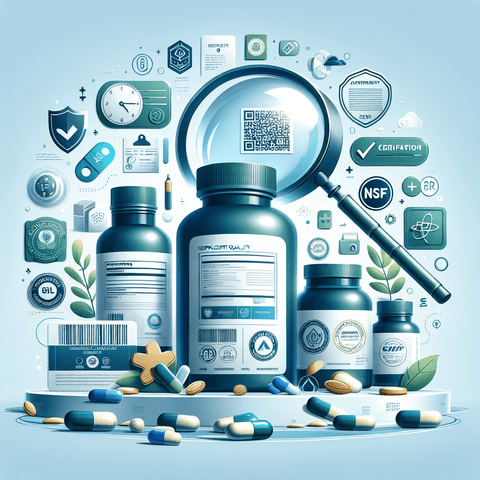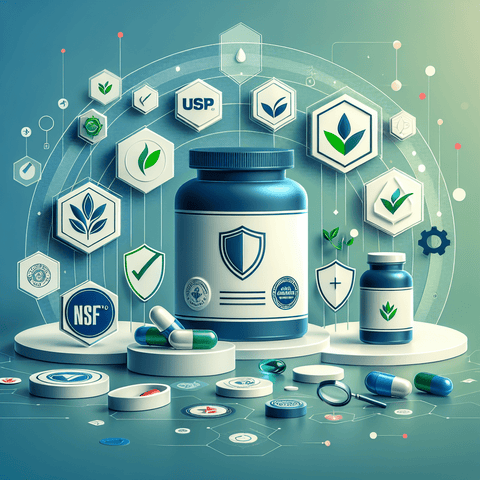Introduction
In today’s fast-paced world, the pursuit of optimal health and wellness has made dietary supplements a daily staple for many individuals. From boosting immune function to supporting bone health, nutritional supplements offer a convenient way to fill nutritional gaps and enhance overall well-being. However, with the booming supplement industry comes a significant challenge: not all products on the market are created equal. The prevalence of counterfeit, low-quality, or mislabeled supplements poses risks to consumers, who may unknowingly compromise their health or waste money on ineffective products.
Choosing high-quality supplements is not just a matter of personal preference but a vital aspect of safeguarding your health. Consumers must be equipped with the knowledge to identify genuine and trusted brands, understand industry standards, and verify product authenticity. This comprehensive guide aims to unlock the truth about supplement quality, empowering you to make informed decisions and select products that truly support your health goals. Whether you are supplementing with Vitamin D for immune support or Omega-3s for brain health, being able to recognize reputable brands and verify quality is essential in navigating the crowded supplement marketplace.
1. Understanding the Role of Supplement Quality in Your Health
Supplement quality refers to the safety, potency, purity, and consistency of a nutritional product. It encompasses multiple factors, including sourcing raw ingredients, manufacturing processes, and testing procedures. When we talk about supplement quality, we are addressing whether the product provides the claimed nutrients at the specified levels without contaminants or harmful substances.
High-quality supplements are crucial because their efficacy depends largely on their formulation and manufacturing standards. Poor quality products can contain insufficient amounts of active ingredients, be contaminated with heavy metals, pesticides, or microbial agents, and even pose serious health risks. Conversely, reputable supplements provide reliable dosages, are free from harmful contaminants, and are manufactured under strict quality controls. Making informed choices about supplement quality ensures that your health investments truly deliver the benefits you seek, whether that’s supporting your immune system, improving bone density, or maintaining overall vitality.
In the context of health maintenance, understanding the importance of supplement quality helps you avoid unnecessary exposures to toxins and ensures that your supplement regimen is both safe and effective. It also supports long-term wellness strategies, as consistent and trustworthy supplementation can enhance your overall health outcomes over time.
2. Supplement Quality Assurance: Ensuring Safety and Efficacy
Supplement quality assurance (QA) is a comprehensive system implemented by manufacturers to guarantee that products meet safety, potency, and purity standards from raw material sourcing to finished product. QA involves numerous rigorous processes designed to prevent contamination, ensure accurate labeling, and maintain product consistency.
Key components of supplement QA include Good Manufacturing Practice (GMP) compliance, sourcing high-quality raw ingredients, implementing strict manufacturing controls, and performing regular quality checks. GMP guidelines, established by regulatory bodies such as the FDA in the United States or equivalent agencies worldwide, set the standards for proper manufacturing, quality control, and testing procedures to ensure consumer safety.
Certifications such as NSF International, United States Pharmacopeia (USP), and others serve as external attestations of a brand’s commitment to quality assurance. When a supplement bears these certifications, it indicates adherence to strict standards for ingredient quality, labeling accuracy, and absence of contaminants.
For consumers, evaluating a brand’s quality assurance measures can reveal much about its reliability. Look for brands that openly share their manufacturing processes, third-party testing results, and certification credentials. This transparency not only signifies a brand’s confidence in its products but also provides peace of mind that you’re choosing a product designed with quality and safety at the core.
3. Trusted Supplement Brands: Building Confidence Through Reputation and Transparency
A trusted supplement brand is characterized by transparency, consistent quality, and a strong reputation within the industry. Such brands prioritize honest communication, clear labeling, third-party testing, and adherence to safety standards. Customers’ confidence in a brand often stems from its history of positive reviews, reputable certifications, and commitment to quality control.
Key characteristics of reputable brands include detailed label information, ingredient sourcing transparency, third-party verification, and active engagement with consumer feedback. For instance, brands that provide access to testing reports or quality certificates demonstrate their dedication to transparency and help consumers verify product authenticity.
To identify trusted brands, consider their industry standing and compliance with recognized standards such as GMP or NSF certifications. Additionally, explore customer reviews and testimonials on third-party platforms, as consistent positive feedback can be indicative of reliability and high product quality. Resources like dedicated supplement directories or review sites can also aid in verifying reputable brands.
Choosing a product from a well-established brand with a solid reputation reduces the risk of counterfeit or substandard supplements. Remember, investing in trusted brands ensures you’re supporting your health with products that have been scrutinized and validated for quality and safety.
4. Genuine Supplement Testing: Verifying Product Authenticity and Content
Testing is a critical step in verifying the authenticity and content of nutritional supplements. Reliable testing methods not only confirm that the product contains the stated ingredients but also ensure it’s free from contaminants and adulterants. Laboratories employ a range of analytical techniques, including chromatography and mass spectrometry, to verify potency and detect impurities.
Potency testing measures the actual amount of active ingredients present, ensuring label claims are accurate. Contamination screening detects heavy metals, microbes, pesticides, and other harmful substances that could threaten your health. Ingredient verification checks the authenticity of plant and mineral sources used in the supplement.
Third-party laboratories play an essential role by providing unbiased testing results. Reputable brands often share certificates of analysis (COAs) or lab reports that validate product quality. Consumers can access these reports directly from brand websites or upon request.
Red flags include a lack of transparent testing information, inconsistent laboratory results, or claims that cannot be independently verified. These issues may suggest corners are being cut or that the product’s authenticity is questionable. Making an effort to review third-party testing results before purchasing helps ensure you’re getting what you pay for and safeguarding your health.
5. Supplement Authenticity Verification: Confirming the Originality of Your Supplements
Counterfeit supplements are a growing concern worldwide, with fake products often sold through unreliable sources or unregulated channels. Verifying authenticity involves multiple techniques aimed at confirming the product is genuine and untampered.
One effective method is barcode or QR code verification. Many reputable brands incorporate unique codes on packaging that consumers can scan using official apps or websites to verify authenticity. Inspecting packaging for tampering, misspellings, or inconsistent labels can also reveal counterfeit products. Tamper-proof packaging and batch numbers further help guarantee product integrity.
Utilizing official brand websites and recommended retailers minimizes the risk of encountering counterfeit products. Some brands also offer verification tools or apps to authenticate their supplements quickly.
For added security, always purchase from reputable sources such as authorized stores or directly from the manufacturer’s website. Avoiding gray-market or third-party sellers reduces the likelihood of buying counterfeit supplements, ensuring that you receive products that meet quality standards and are safe for consumption.
6. Quality Standards in Supplements: Recognizing Certification and Industry Benchmarks
Several global and industry-specific standards define quality benchmarks for nutritional supplements. Recognized organizations like GMP, NSF, USP, and COSMOS establish criteria that manufacturers must meet to ensure product consistency, safety, and efficacy.
Good Manufacturing Practice (GMP) is a foundational standard that mandates manufacturing controls, documentation, and quality systems. NSF International provides third-party certification for supplements, verifying that products meet strict safety and quality standards. The USP verifies ingredients’ purity, potency, and consistency through rigorous testing, and certified products display the USP Verified mark.
Cosmos is an eco-certification standard emphasizing sustainability and organic ingredients, particularly relevant in natural and botanical supplements. Certifications like these serve as indicators of product reliability and adherence to high-quality industry benchmarks.
When shopping, look for certification logos on labels and check that products comply with recognized standards, as this demonstrates a commitment to quality assurance. Prioritizing certified supplements increases confidence that the product has been produced under strict quality controls and meets safety requirements.
Conclusion
Choosing high-quality, genuine supplements is essential for supporting your health safely and effectively. Understanding principles of supplement quality assurance, recognizing trusted brands, verifying product authenticity through testing, and prioritizing recognized industry standards form the foundation of smart supplement purchasing. Transparency, certification, and third-party testing are key indicators of a reputable product that aligns with your wellness goals.
Always do your due diligence—research brands, review third-party test results, and purchase from reputable sources to reduce the risk of counterfeit or substandard products. Remember, a well-informed consumer is empowered to make decisions that truly benefit their health. Prioritize quality, integrity, and safety in every supplement you choose, and you’ll be better positioned to achieve your health aspirations confidently.
Call to Action
Visit topvitamine.com for curated lists of trusted supplement brands and top-quality products. Before starting any new supplement regimen, consult with healthcare professionals to tailor your choices to your individual needs. Subscribe to receive updates and tips on supplement quality, industry standards, and health optimization to stay informed and make the best choices for your well-being.
Q&A Section
Q: How can I tell if a supplement brand is trustworthy?
A: Look for brands that provide transparency about their sourcing, manufacturing processes, and safety testing. Certifications like GMP, NSF, and USP are strong indicators of trustworthiness. Reading customer reviews and accessing third-party testing reports further helps ascertain reliability.
Q: What are some key signs of counterfeit supplements?
A: Signs include suspicious packaging, misspelled labels, missing batch numbers, lack of certification, and products purchased from unverified sources. Using official verification tools or apps can help confirm authenticity.
Q: Why is third-party testing important?
A: Third-party testing provides an unbiased assessment of the supplement’s potency, purity, and safety. Certificates of analysis from independent laboratories add an extra layer of verification, ensuring the product contains what it claims and is free from harmful contaminants.
Q: How do I know if a supplement meets quality standards?
A: Check for industry-standard certifications such as GMP, NSF, USP, or COSMOS on the label. These certifications validate that the product adheres to strict manufacturing and safety criteria.
Q: What steps should I take to verify a supplement’s authenticity when purchasing online?
A: Purchase from reputable sources, verify packaging and batch numbers, and use official barcode or QR code verification tools provided by the brand. Avoid buying from unknown or unverified third-party sellers.
Important Keywords
- Supplement quality
- Trusted supplement brands
- Supplement authenticity verification
- Quality standards in supplements
- Third-party testing supplements
- GMP certified supplements
- Supplement certification
- Counterfeit supplements
- Supplement label transparency
- Supplement safety and efficacy



